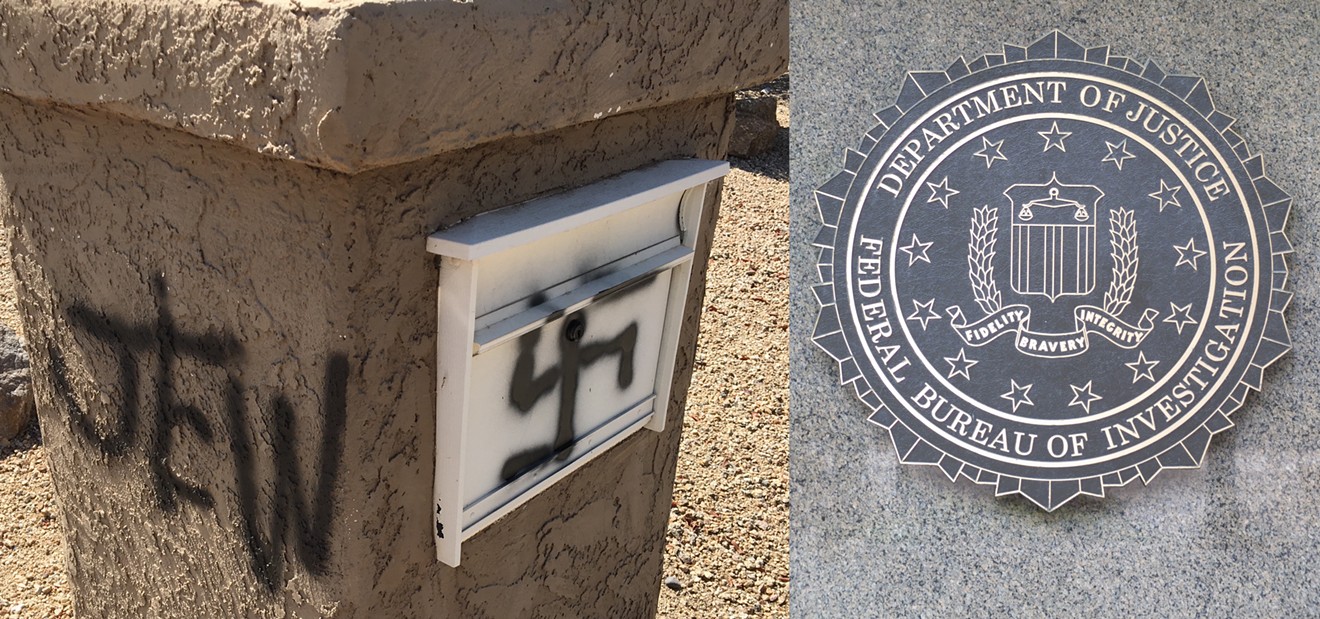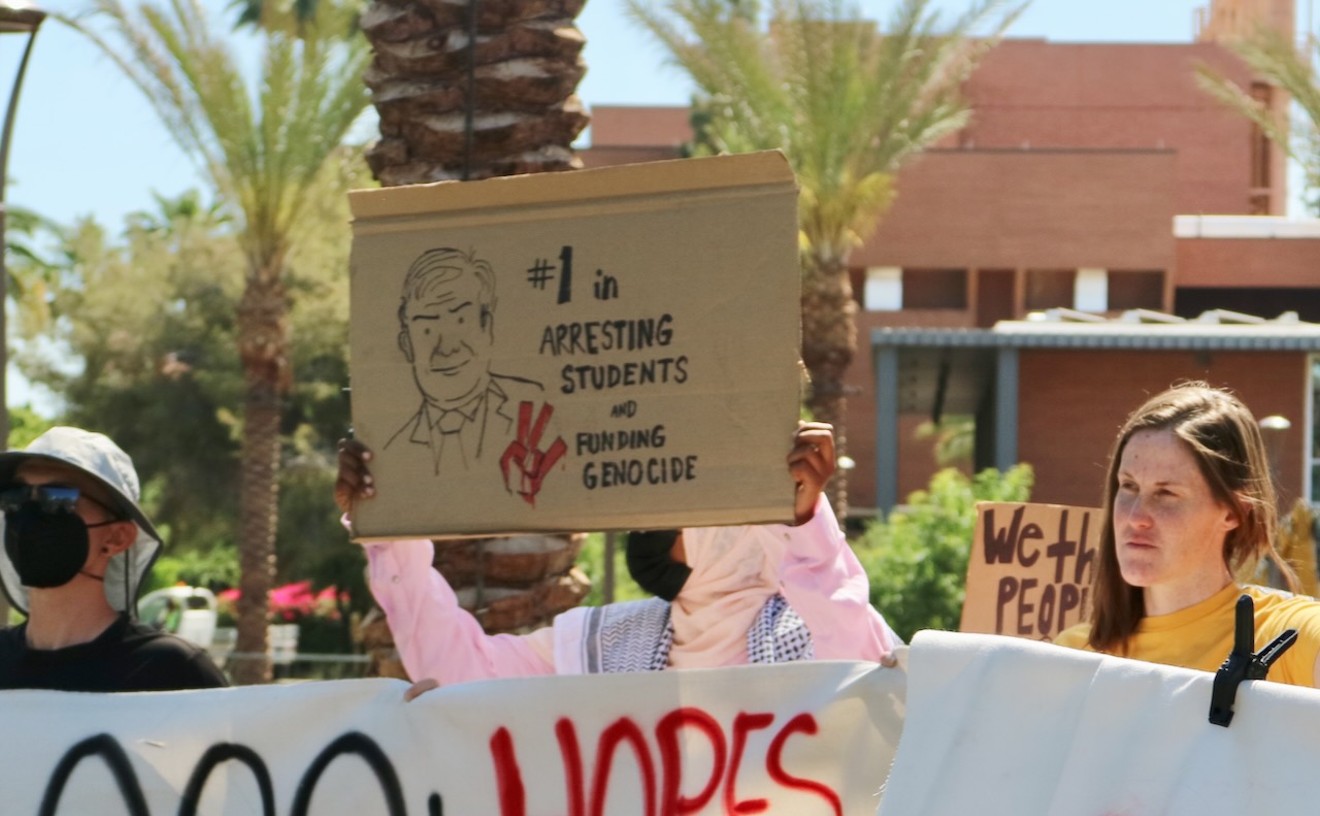When it came time to submit last year's hate crime statistics to the Federal Bureau of Investigation, more than a dozen law enforcement agencies across Arizona didn't get it done.
Sixteen jurisdictions didn't send 2016 hate crime data to the FBI, even though they had submitted statistics for the previous report. The agencies include various police departments, tribal authorities, and one college, leaving a noticeable gap in last year's data. Often, these agencies argued that their jurisdiction experienced no hate crimes in 2016, so they had nothing to report anyway.
For the 2015 report, 101 Arizona jurisdictions submitted information to the FBI. But last year, the number of reporting jurisdictions dropped to 85.
After the FBI released the annual report earlier this month, Phoenix New Times contacted all of the Arizona law enforcement agencies that stopped submitting hate crime data between the 2015 and 2016 annual reports.
Of the jurisdictions that responded, some admitted that they simply forgot or missed the deadline. Others initially told New Times that they sent their data, when in reality they were late and don't appear in the FBI report as a result.
It should be noted that hate crimes actually declined slightly in Arizona last year, according to the FBI annual report. From 2015 to 2016, hate crimes dropped from 276 to 213. Most of the hate crimes took place in Phoenix, which reported 231 hate crimes in 2015, compared to 174 in 2016.
But even if the state experienced fewer hate crimes last year, the decrease in the number of participating agencies leaves gaps in a highly cited annual report.
Even more important? Experts say the FBI report barely scratches the surface in terms of the actual number of bias and hate incidents that occur nationwide, making it crucial that agencies send their stats — even if they recorded zero hate crimes.
The Arizona Department of Public Safety collects hate crime data from jurisdictions statewide before submitting the numbers to the FBI. Statistics from tribal authorities are submitted to the Bureau of Indian Affairs.
When asked about the hate crime reporting decrease, DPS spokesperson Quentin Mehr wrote in an email, "We do reach out to agencies throughout the year, reminding them to submit their data by a specified date. If an agency does not submit all 4 quarters of data, they will not be published in the [report]."
Mehr explained that DPS asks local jurisdictions to submit their data using a separate, specific hate crime form that includes a signed zero report "verifying the jurisdiction had no hate crime incidents for that particular quarter." According to the agency, DPS "keeps both manual and electronic logs of every participating agency to track which months of data they submit to us, including hate crime statistics."
The annual FBI report is a significant government attempt to track the nationwide scope of hate incidents, a notoriously difficult crime to document. At the same time, the report is regarded as a lowball estimate of the true scope of hate and bias. It almost certainly omits many of the daily experiences of harassment and intimidation that go unreported to police.
In an effort to fill the gap, last year news organizations and advocacy groups aimed to chronicle and count a wave of hate crimes and bias-motivated attacks and harassment in the wake of the election.
Part of the problem with the FBI report is that it depends on voluntarily submitted data from local law enforcement agencies, which may be understaffed or focused on other priorities. That certainly seems to have been the case in many small Arizona jurisdictions.
Dina Francis, Safford Police Department administrative assistant for records, said that reporting hate crimes to DPS slipped through the cracks among other priorities, even though her department submitted data the year before.
“I think I forgot it," Francis said. "I’ll be honest.”
“Sounds like I’m not the only one that got overwhelmed and busy," she added of the decline in Arizona agencies that reported hate crime stats.
Bayden Grover, marshal for the town of Fredonia, acknowledged that he probably neglected to send the information on hate crimes.
“It might just be an oversight," he said. "Because normally I take care of all that, and it just didn’t get done on my part.” However, Grover added that Fredonia has had virtually no hate crime incidents during his 18 years in the town.
Other jurisdictions say they submitted hate crime data as usual, even though their jurisdiction does not appear in the FBI's final report.
Diane Cauthen, chief of police for the town of Pima, said that she thought she had submitted the numbers to DPS. "I was almost 100 percent sure I put it in," she said. "They compile all of the stuff, and they put it to the FBI.” Nevertheless, the town of Pima does not appear in the FBI report for 2016.
Like other small jurisdictions, Cauthen emphasized that her department did not witness any hate-based incidents in 2016.
Pima Community College also missed the deadline for submitting hate crime data to the FBI. Campus Chief of Police Christopher Albers said that his department did not record any hate incidents in 2016, but all the same, the college is absent in the FBI's annual report.
Danielle Wallace, an associate professor of criminology and criminal justice at Arizona State University, said that even if departments don't witness any hate crimes in a particular year, it's still important to record that data for the federal report.
Put another way? "Those 0's are important!" Wallace wrote in an email.
If departments don't bother to report their data, there are consequences, she said. "This lack of information biases the data in ways we don’t understand," Wallace wrote.
Getting a sense of what hate crimes are most common here and where they occur is only possible if departments report to the FBI, she explained. Without a running tally, it's hard to draw conclusions about hate in Arizona.
Wallace wrote, "We’d be unable to see how many hate crimes truly happen in the state, and probably some counties. We just can’t get a true handle on this."
[
{
"name": "Air - MediumRectangle - Inline Content - Mobile Display Size",
"component": "18478561",
"insertPoint": "2",
"requiredCountToDisplay": "2"
},{
"name": "Editor Picks",
"component": "16759093",
"insertPoint": "4",
"requiredCountToDisplay": "1"
},{
"name": "Inline Links",
"component": "17980324",
"insertPoint": "8th",
"startingPoint": 8,
"requiredCountToDisplay": "7",
"maxInsertions": 25
},{
"name": "Air - MediumRectangle - Combo - Inline Content",
"component": "16759092",
"insertPoint": "8th",
"startingPoint": 8,
"requiredCountToDisplay": "7",
"maxInsertions": 25
},{
"name": "Inline Links",
"component": "17980324",
"insertPoint": "8th",
"startingPoint": 12,
"requiredCountToDisplay": "11",
"maxInsertions": 24
},{
"name": "Air - Leaderboard Tower - Combo - Inline Content",
"component": "16759094",
"insertPoint": "8th",
"startingPoint": 12,
"requiredCountToDisplay": "11",
"maxInsertions": 24
}
]












